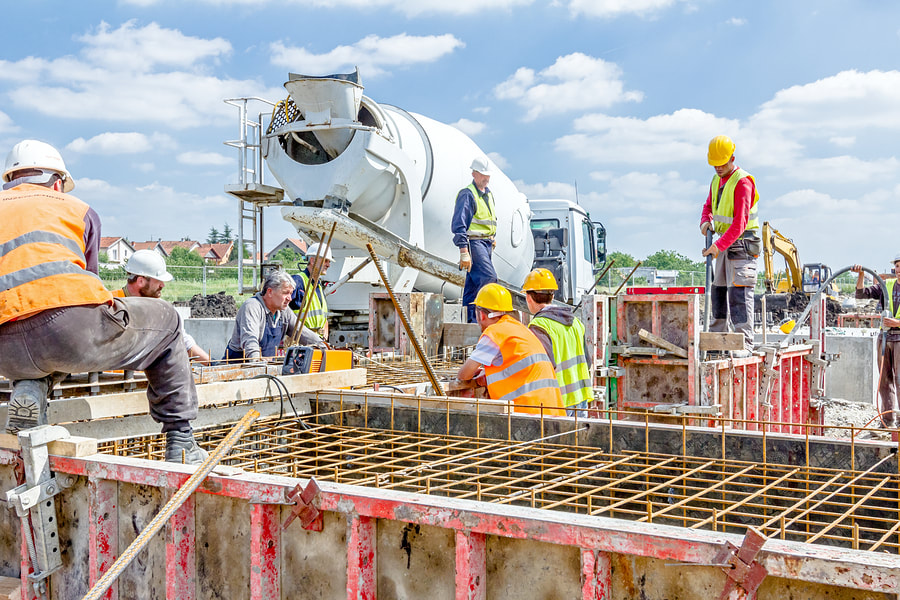Introduction: Building Strong Foundations with Expertise
When constructing commercial and industrial buildings, the foundation serves as the backbone of the entire structure. A flawed foundation can lead to costly repairs, operational delays, and safety hazards. This is why hiring a professional Commercial Concrete Contractor like Randahl Construction is essential. With decades of experience in concrete construction, our team ensures precise, durable, and reliable foundations for every industrial project.
A foundation is more than just a slab of concrete. It must support heavy machinery, withstand constant stress, and resist environmental conditions. Whether it is a warehouse, a factory, or a large commercial complex, a high-quality concrete foundation guarantees durability, safety, and long-term efficiency.
What is a Commercial Concrete Contractor?
A Commercial Concrete Contractor specializes in large-scale concrete projects for commercial and industrial facilities. Unlike residential concrete work, commercial projects require a deep understanding of engineering principles, large-scale equipment handling, and advanced concrete techniques. Contractors in this field ensure that foundations, walls, and slabs meet structural standards and can sustain heavy loads over time.
These professionals work closely with engineers and architects to provide solutions that are both practical and durable. From planning the concrete mix to precise installation, a commercial concrete contractor oversees every stage to deliver optimal results.
Why Precision Matters in Industrial Foundations
Precision is a critical factor in industrial foundations because even minor errors can lead to serious problems. Industrial buildings often contain heavy machinery, storage racks, and manufacturing equipment. A foundation must distribute the weight evenly to prevent sinking, cracking, or tilting. Additionally, precise foundations enhance durability and reduce long-term maintenance costs.
For instance, consider a manufacturing plant installing stamping machines. If the concrete slab is not perfectly level or reinforced, machinery could malfunction, causing production delays and expensive repairs. A Commercial Concrete Contractor ensures accuracy in every stage, from excavation to curing, to prevent such issues.
Services Offered by a Commercial Concrete Contractor
Professional commercial concrete contractors provide a wide range of services tailored to industrial needs. Industrial foundations are designed to handle heavy loads and constant wear. Contractors ensure that the soil is properly prepared, the rebar is reinforced correctly, and the concrete is poured and cured to exact specifications.
Concrete slabs and flooring in commercial settings must be durable and smooth. Polished concrete floors are often used in warehouses and factories to allow forklifts and machinery to operate efficiently. Reinforced slabs are designed for areas that experience heavy foot or equipment traffic, reducing the likelihood of cracks or structural weaknesses.
Poured walls and retaining structures are another specialty. Industrial walls need to be strong enough to support large buildings and sometimes even serve as retaining walls to prevent soil erosion. A skilled contractor can customize wall thickness and reinforcement to match the structural requirements of each project.
Sidewalks and exterior surfaces are also part of the contractor’s responsibilities. Even outdoor concrete must be durable and weather-resistant, especially in climates with frequent freezing and thawing cycles. Proper drainage and smooth finishing are critical to prevent damage over time.
Commercial concrete contractors also handle repairs and maintenance for existing structures. Over time, concrete may deteriorate due to heavy usage or environmental stress. Professional contractors can repair cracks, resurface floors, and provide preventive maintenance to extend the life of industrial concrete structures.
The Process of Industrial Concrete Construction
The process begins with a detailed site assessment, where soil testing and boundary measurements are conducted. A thorough evaluation identifies potential stability issues and helps determine the type of foundation needed. Following the assessment, contractors collaborate with engineers to design the foundation, select the appropriate concrete mix, and plan reinforcement layouts.
Excavation and formwork come next, with careful leveling of the site and construction of forms to shape the concrete. Rebar is installed for reinforcement, ensuring that the foundation can support the weight of the building and machinery.
Concrete is then poured using specialized equipment. Vibrators are used during pouring to eliminate air pockets, resulting in a smooth, strong foundation. Curing is a critical step, where the concrete is kept moist to achieve maximum strength. Quality control checks, including stress and strength testing, are conducted throughout the process.
The final step is inspection, where the foundation is evaluated against engineering specifications and building codes. Once approved, construction of the superstructure can proceed with confidence in the foundation’s integrity.
Benefits of Hiring a Professional Commercial Concrete Contractor
Working with an experienced Commercial Concrete Contractor ensures expertise, efficiency, and long-term value. Contractors understand concrete behavior, industry standards, and local building codes. Their experience reduces the likelihood of costly mistakes, accelerates project timelines, and ensures safety compliance.
A professional contractor also brings durability and precision to every project. Foundations are designed to last decades without significant repairs. For example, Randahl Construction completed an industrial facility foundation that has supported heavy machinery for over 15 years without any structural issues. This demonstrates the value of hiring a reliable commercial concrete contractor.

Choosing the Right Commercial Concrete Contractor
Selecting the right contractor is crucial to the success of any industrial project. Experience and reputation are essential factors, as is the contractor’s ability to handle large-scale projects efficiently. Licensing, insurance, and certifications provide assurance of professionalism and compliance with safety standards. Modern equipment and innovative construction techniques further indicate a contractor’s ability to deliver precise results.
Clear communication between the contractor and client is also vital. Detailed planning, progress updates, and problem-solving ensure that expectations are met and that the project runs smoothly from start to finish.
Cost Considerations in Commercial Concrete Construction
The cost of industrial concrete foundations varies depending on several factors. The size and complexity of the project, the type of concrete mix, reinforcement requirements, and site conditions all impact the final price. Additionally, finishing details and aesthetic requirements may increase costs.
Understanding these factors allows clients to plan budgets effectively while prioritizing quality and durability. Investing in a professional commercial concrete contractor can prevent future expenses related to foundation failure or inadequate construction practices.
Case Study: Industrial Warehouse Foundation
Randahl Construction recently completed a foundation for a 50,000-square-foot industrial warehouse in Minnesota. The project required a reinforced concrete slab capable of supporting heavy forklifts and storage racks. Uneven soil conditions and a tight schedule presented challenges, but the team stabilized the soil, installed precise rebar layouts, and used a high-strength concrete mix. The result was a foundation that passed all inspections, supported heavy machinery, and has remained durable for over five years. This case study illustrates the importance of precision and expertise in commercial concrete construction.
Innovations in Commercial Concrete Construction
Modern commercial concrete construction has benefited from technological advancements. Laser leveling ensures perfectly flat surfaces, fiber-reinforced concrete reduces cracking, and eco-friendly concrete mixes minimize environmental impact. 3D modeling allows contractors to plan projects with high accuracy, reducing errors and saving time. Contractors who embrace these innovations deliver better results, enhance durability, and provide clients with foundations that withstand the test of time.
Internal Linking Ideas
For SEO purposes, internal linking can improve user experience and site authority. Mentioning services such as industrial slabs, poured walls, or floor repairs can link to Randahl Construction’s service pages. References to case studies can link to a portfolio or completed projects section. Advising clients to hire a contractor can link directly to the contact page. This strategy enhances SEO, keeps readers engaged, and demonstrates expertise.
Conclusion: Precision You Can Trust
Industrial foundations are critical to the safety, functionality, and longevity of commercial buildings. Hiring a skilled Commercial Concrete Contractor like Randahl Construction ensures every stage, from site assessment to curing and final inspection, is handled with precision. Expert contractors deliver foundations that support heavy machinery, endure environmental stress, and minimize future maintenance. Investing in professional concrete services today ensures the stability and efficiency of your industrial facility for decades. Our homepage is your go-to spot for fresh, reliable content.
FAQs
What does a Commercial Concrete Contractor do?
A Commercial Concrete Contractor handles large-scale concrete projects, including industrial foundations, slabs, and walls. They ensure that concrete structures are precise, durable, and meet engineering standards.
How long can an industrial concrete foundation last?
With proper materials, reinforcement, and curing, an industrial concrete foundation can last 50 years or more. Regular inspections and maintenance extend its lifespan even further.
Why is accuracy important in commercial concrete construction?
Accuracy ensures weight is properly distributed, machinery operates safely, surfaces remain durable, and structural failures are prevented. A precise foundation reduces repair costs and improves safety.
